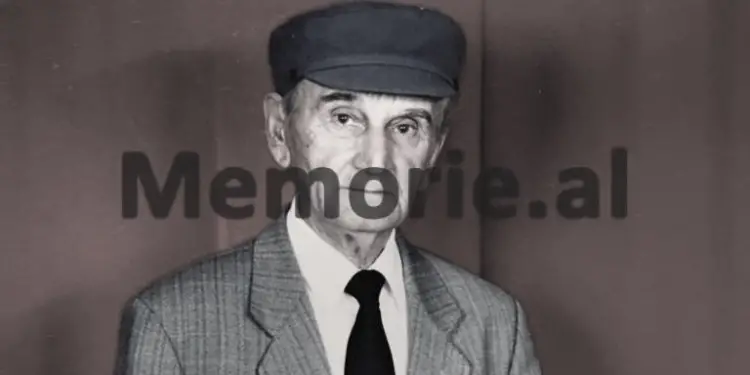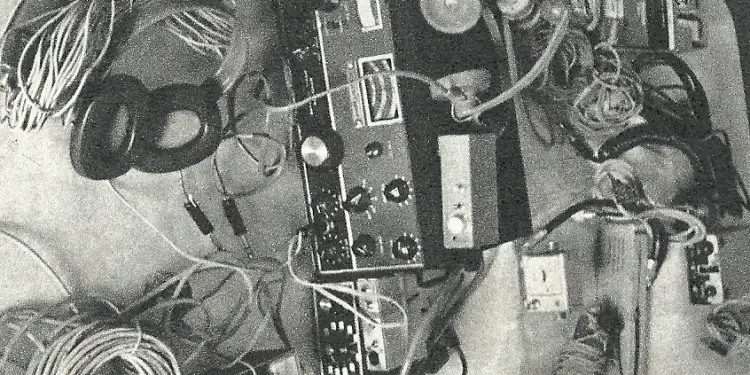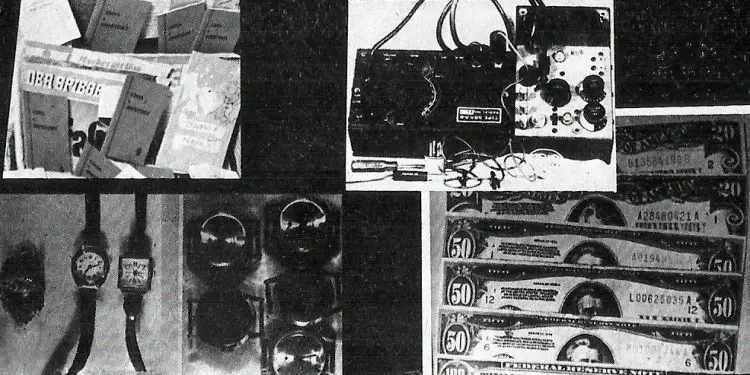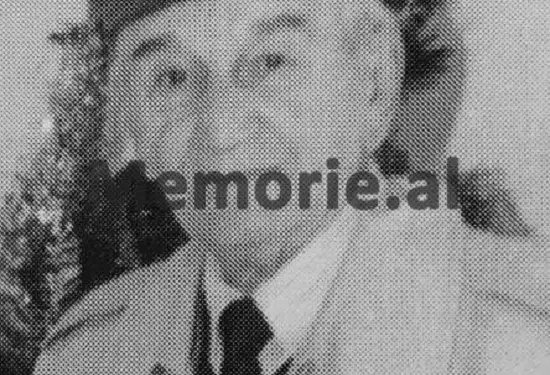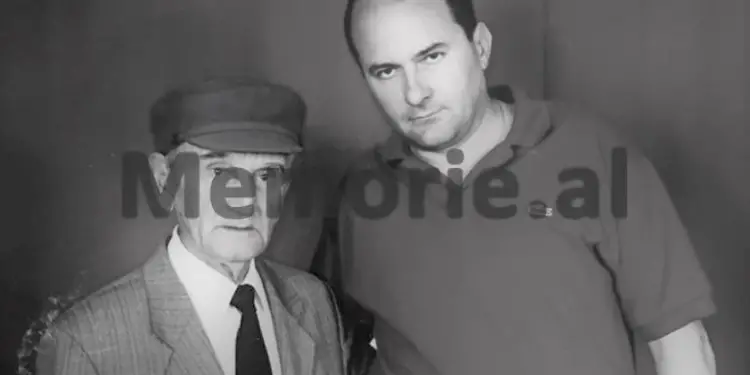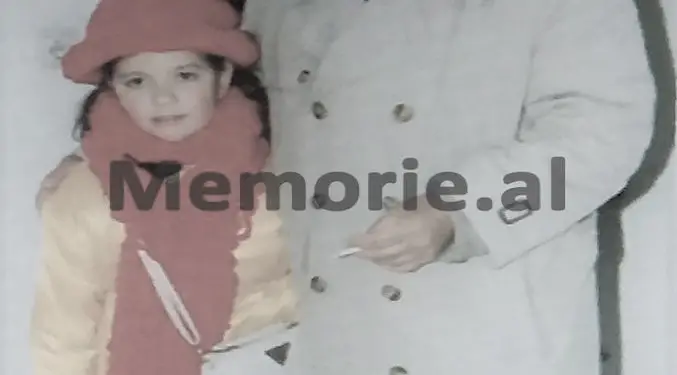Dashnor Kaloçi
The fifth part
Memorie.al/ publishes the unknown and rare story of Avdul Hakan Banushi, originally from the village of Golem in Gjirokastra, who during the period of occupation of the country (1939-1944), unlike his entire family who lined up in the ranks of partisan forces, he joined the nationalist youth organization “Balli Kombëtar” in the city of Durrës, where he was arrested by German forces in October 1943 and together with 73 other people, were initially sent to the German camp in Prishtina, and then to the mass extermination camps at Landsberger and Dakau, from where he could only be released in 1945, after the intervention of Anglo-American forces. Banushi returned to Albania in 1945, after staying for some time in the Reggio-Emilia camp in Italy, (where at that time were also some of the main leaders of ‘Balli’ and ‘Legality’ led by Mit’hat Frashëri and Abaz Kupin) and his arrest a few days after arriving home, after at Lapraka airport, partisan guards found a letter given to him by the former Prefect of Gjirokastra, Rasim Babameto, while they were in Reggio-Emila. Banush was sentenced to 18 years in prison, accused of being an “agent of the Anglo-Americans” and released in 1961, where he did not spend much time with his family in the village of Golem, after being arrested again while interned in the town of Fier, from where he managed to escape from prison the first night and fled in the direction of Gjirokastra, where he crossed the state border and went to Greece, where he soon gained political asylum in the United States. Banushi’s engagement in the ranks of the Albanian political diaspora in the West, as a member of the “Free Albania Committee”, where in 1973, after being trained by the CIA, he came several times with secret missions to Albania, in order to carry out assassinations Enver Hoxha in the big parade of November 29, 1974, on the occasion of the 30th anniversary of the liberation and his arrest in 1975 near the border of Hani i Hotit, after a trap set by the Minister of Internal Affairs, Kadri Hazbiu , from where he would then be isolated for two years in the cells of ‘Ward 313’ in Tirana Prison and then in Burrel, from where he could only be released in early 1991.
“When the first contradictions of official Tirana with the People’s Republic of China started in 1972-’73, we became even more confident that the time had come to organize concrete measures for a possible landing in Albania. After talks between the leaders of the “Free Albania” Committee and Mr. Joseph Shishko, Deputy Secretary of State, and Major Thomas Smith, who covered Albanian political emigration to the United States, in January 1974, the presidency of the organization “Albanian Anti-Communist Resistance Front” decided to send to Albania the first group, which would consist of five people. Among the main tasks that the group would perform were: ‘Meetings with people dissatisfied with the communist regime, the demolition of the Stalin and Lenin monument in the center of Tirana, the blowing up of the headquarters of the Central Committee of the ALP, the distribution of anti-communist propaganda materials, which had been prepared in New York, etc. It was decided that the first group would be led by me, as I was acquainted with the contingent of families persecuted by the communist regime, where we would initially rely. In addition to me, this group also included: I. Rrushiti, N. Banushi, I. Lame and A. Sula. After some intensive preparations we made on a secret basis, we finally set off on the plane that would traverse the route: New York – London, – Amsterdam – Rome – Athens. When we arrived in the Greek capital, we took refuge in the Hotel “Atlantik” and the next day we went to the military base of Preveza, where the colonel who was waiting for us supplied us with weapons consisting of five automatic weapons, five pistols, 20 grenades, 6 kg dynamite, capsules and mechanical devices for detonating them, swimming gear, a radio transmitter and transmitter, as well as many other ammunition and equipment. After arranging these in a safe place, I talked to the colonel about the possible routes we had to follow to enter Albania and at seven o’clock in the evening we set off in a small speedboat run by three sailors and after a few hours we arrived in the coast of Ksamil”.
This is how Avdul Hakan Banushi, originally from Golem of Gjirokastra, remembered the beginning of the “Albanian adventure”, who told us for the first time some of the most sensational events of his life, which took place in 1974 – ’75, when he, at the head of a commando group launched by the United States of America, entered Albania several times with secret missions.
Who was Avdul Banushi and what is his past? Why was he interned in the Nazi concentration camp in Dakao, Germany, and how did he manage to escape? How did he return to Albania in October 1945 and why was he sentenced to 18 years in prison, being accused of being an agent of the Anglo-Americans? How did he manage to escape from the Fier Branch of Internal Affairs in the first days of August 1961 and how did he cross the border into Greece? What was asked of him in Athens and how did he gain political asylum in the United States? Who were the Albanian anti-communist leaders who organized the “Throne of Anti-Communist Resistance” and why did the “Albanian adventure” of Abdyl Banushi and the assassination of Enver Hoxha in the big parade of the 30th anniversary of liberation on November 29, 1974 fail? Who was the man who accompanied and betrayed Abdyll Banushi on his last mission in Albania, which caused him to fall alive into the hands of the Albanian border forces near Hani i Hotit, from where he would be isolated in the horrific Burrell prison, until the fall of the communist regime in 1991? Regarding these and many other events and facts, we know the exclusive interview given to us by Mr. Banushi, a few years ago, which will be in six numbers in a row.
Continued from the previous issue
Mr. Banushi, what did you say to the Presidency of the “Resistance Front?”
After we reported on the action, the entire Presidency of the Committee “Free Albania” and the “Anti-Communist Resistance Front” congratulated us and called it a successful action.
What was the attitude of the Americans towards this event?
Before we went to the “Free Albania” Committee, Major Thomas Smith called Dr. Rexhep Krasniqi and protested harshly, saying: “Mr. Krasniqi, you have formed a terrorist organization that bombs embassies. Krasniqi did not accept that and asked me on the phone to go there, where he was waiting for me with Major Smith. As soon as I got there, Smith said to me ironically: “Come on, freedom fighter” and after hugged me, he told me why I had been absent from work for so long. I tried to lie to him, telling him I had been to the French Riviera for vacations, but he interrupted me and said: “Listen here, if be for me, I want to uproot communism in Albania, but the US does not allow terrorism. If from now on there will be an explosion in the Albanian embassies wherever they are, you will be extradited from where you came from. That’s the last word I say. ”
After these decisions taken by the “Resistance Front”, were the groups formed and how would they enter Albania?
Immediately after the decisions taken by the “Anti-Communist Resistance Front”, the first two groups of five people each were formed, one of which I would lead. The first difficulty that arose for us was how we would transport weapons and explosives from the US to Albania, because the “Resistance Front” had not yet come into contact with the US government to obtain ‘ ok ‘for this thing. At first I proposed to choose some light weapons, which we would secretly transport to the American authorities. But this was rejected by the leadership of the organization, because it would create big problems for us.
How was this problem solved?
“With my proposal it was decided that all the necessary weapons would be delivered to the American air base of Preveza in Greece, where I had known some Albanian anti-communists since I was in Greece. After that on December 14, 1973, I immediately left for Greece and according to the conversation with my friend, I met with the American Colonel Bill, who guaranteed me all the weapons by letting me see them in the depot. Also the American Colonel also assured me that he would help us through a small motorboat, to take us to Albania via the coast. When we were parting, the American colonel asked me for a declaration of allegiance, which I immediately issued to him. After that, very satisfied, I immediately returned to the United States, where I met and Dr. Hamdi Uruçi, who had just returned from Yugoslavia, where he had prepared two bases, one in Ulcinj and the other in Hot. Albania group of first, which would consist of five people.
This group or other groups that would enter Albania, what preparations did they have and where did they develop them?
Shortly after the groups were formed, we underwent a comprehensive months-long training at a secret military base in the Amazon.
Specifically what training do you do and who were your instructors?
What does this matter ?!
Who were the other people in your group?
The members of the group I led were: I. Rushti (married with two children) N. Banushi, (my cousin) A. Sula and I. Lame. Following the decision of the “Resistance Front”, we came with different aircraft through our bases that we had previously established in different European countries. After meeting in Italy where we had left our place and meeting point, we left for Greece, where we met Colonel Bill at the American air base in Preveza. There we were supplied with the necessary tools, starting from the sophisticated armaments and all the other equipment we needed.
Specifically with what weapons were you supplied?
There we got five “Thomson” automatics, five pistols, 20 defensive grenades, 6 kg of DT dynamite, automatic capsules and detonation mechanisms, swimming tools, a transceiver and a lot of ammunition. We arranged all these weapons in some geologists’ bags were on their side pages was written: “Directorate of Geology Tirana. The automatic” Thomson “was mounted in such a way that if we needed to shoot with it, you did not need to pulling it out of the bag, but it is enough to pull one of the chains of the bag a little and he fired in bursts, having the pocket from which the cartridges came out. This was valid for any surprise police check.
With what documents would you enter Albania and how would you camouflage yourself within the Albanian territory?
The problem of documents had been solved in the USA, where each of us was provided with five Albanian letter-notifications with false names. We also had five party documents that corresponded to the names written on each ID card. Each of our ID cards corresponded to the border districts, such as: Shkodra, Korça, Gjirokastra, Saranda and Vlora. The main passport that I would use in Albania, was with the name Bashkim Fratari, while the one for abroad, with the name Tomas Brangel. In addition, we had a Geology document, signed by Interior Ministry Colonel Jaup Dabulla, that allowed us to move “for the needs of Geology” to the border areas very close to the clone. All these documents were forged in the most perfect way, so that no one could distinguish them. To realize them, the documents of an Albanian officer who had escaped from Albania and had come to America were used. Also from New York, we had received a sufficient amount of dollars and Albanian lek, which I administered as chairman of the group.
How did you enter Albania?
After we were armed at the base of Preveza by the American Colonel Bill, he gave us a small motorboat run by three sailors, with which we set off at seven o’clock in the evening and through it after a few hours we landed on the rocky coast of Ksamil in south of Saranda. After we gave the submarine captain the return code, he left where he had come from, while we waited for the day to dawn which seemed very long to us.
Where did you go then?
From Ksamil as geologists we left in the direction of Butrint, where we got on a bus that took tourists and with it we went to Saranda. When we got there, I became interested and found a truck that had unloaded coal in the port, which took us above the body to Gjirokastra. When we went down to the city of Gjirokastra, I told my friends to move freely around the city two by two and to meet at Qafa e Pazarit.
Were you not afraid that they might recognize you in your town?
I could not think because I had a long time to leave, but here it happened. As soon as I went down the stone steps of my city, I remembered a message from Prof. Stavro Skëndit in New York, who had ordered me to buy a dictionary of today’s Albanian language. The first bookstore was on the main road leading to Qafën e Pazarit and the bookseller was called Sava. While I was taking out the money to pay for the dictionary, two men entered the bookstore, one older and one younger. I saw them out of the corner of my eye and recognized them immediately. I shivered as they knew me well too. The oldest was Rexhep Kroi from the village of Kardhiq and the youngest, Daut Myrto from Mashkullora. Rexhepi had been the deputy commander of the Burrel prison during the years when I was there, while Dauti was the Operational Officer in the Kardhiqi area. As soon as they saw me, they recognized me and Rexhepi said to me: “Congratulations Avdul, when you returned from America. Have you been amnestied”? I turned my head calmly and said: “Do you talk to me?” with you… “. I smiled and told him that I did not know them and that they did not call me Avdul, but Bashkim Fratari, I was a geological engineer by profession. But Rexhep Kroi addressed me again: “Leave them, you are Avdul Banushi yourself who was in Burrel prison and escaped to America”. After that, as I was pulling out my ID, I said, “You’re wrong, friend.” They tore their eyes in astonishment and told me that they still did not believe me. Meanwhile, I was forced to pull out the party document, showing it only to them through the lids, and I said to them, ostensibly angry: Do not provoke the party members, because I will blow their brains out.
What happened next, did they believe you?
Their feathers immediately fell off and they showed insecurity. How to defend himself, Rexhepi told me: “I was an officer of the Internal Affairs Branch, as this friend is here” and waved from operative Daut Myrto. I ironically replied, “Be healthy” and left the bookstore saying, “hello.” As I went outside, I saw my friends waiting for me and I signaled to follow me because I was convinced that Rexhepi and Daut would keep running in the Internal Affairs Branch.
Did they report to the Gjirokastra Internal Branch and where did you go next?
I do not know if they announced, but we quickly got down from the alley to the big Polyclinic of the city, we hid in the Jonuzi family, which was our first base. We stayed there for six days, until the situation calmed down and last night, after leaving 400 USD, at two o’clock after midnight, we left that base and went down to the new neighborhood “September 18”, we went to Granica. Then we walked at the foot of the Broad Mountain, above Lake Viroi and reached a place called Vatuca near the Kardhiqi Bridge. There we learned that an alarm had been given, which indicated that the Gjirokastra Internal Affairs Branch had been notified. After crossing the Cold Water on foot, we bypassed the village of Picar, through the bushes, because we could not get out on the national road, knowing that there was strong control at the Subashi Bridge.
Where did you go next?
We spent the whole day in the bushes and in the dark we went down to the village of Shtëpëz, where we had our base and from there we went down to the Cold Water of Tepelena, where we got on a truck that was going to Memaliaj. After descending to the crossroads of Memaliaj, we got into one of the many cars that were loaded with coal for the TEC and we left in the direction of Fier, where we had our destination.
On the way to Fier, did you have police checks and when did you get to where you went?
On the way from Uji i Ftohtë to Fier, we passed several police checkpoints, which checked our documents and did not suspect at all. In Fier we went and met our man, who was very scared and did not receive us at home. We met him near the buildings on the “Liberation” Farm, a place I knew well when I was interned in Fier. Then from there they boarded an urban bus as ordinary passengers and along the way quite freely we chatted and joked with the passengers, until we arrived in Savër of Lushnja. There we hoped to find great support because it was the place of exile. Knowing that there were a lot of Security people there, I left my friends in a canal somewhere in the open field and I myself went to find our base which was the Çaushi family.
What was that family?
I did not know the owner of the Çaushi family well, but I came there on the recommendation of his two brothers who lived in America as political immigrants and were closely associated with our organization. After I handed him $ 500 and the letter from his two brothers, he was very scared and did not want to wait for us at his house. Then he changed his mind and said that he was waiting for us at home at night. Although we went there with doubts, the opposite happened to us. The owner of the house expressed his unreserved support to us. After leaving the liaison slogans in case other people would come from America, around four o’clock in the morning, we walked away to the fields that seemed endless to us.
Where did you go after fleeing the village of Savër?
Before dawn, we entered the city of Lushnja and went to the family of Ç. Godos, whose father Isa Godo, a former officer of the Zogu Gendarmerie, had fled Albania in 1953 and settled in Brussels, where he continued to be part of our organization. Ç. Godo received us at his house with great fear, but refused to go out to inform the other persons we were looking for, telling us that he was afraid that there might be Security men among them. After leaving his house, we split into two groups and arrived in Durrës with the Cerloi family. She was a family of merchants, and despite all the dangers that lay ahead, she welcomed us very warmly. After three days they agreed to have a meeting there and after we created the new cell, we left for Tirana./Memorie.al
The next issue follows




